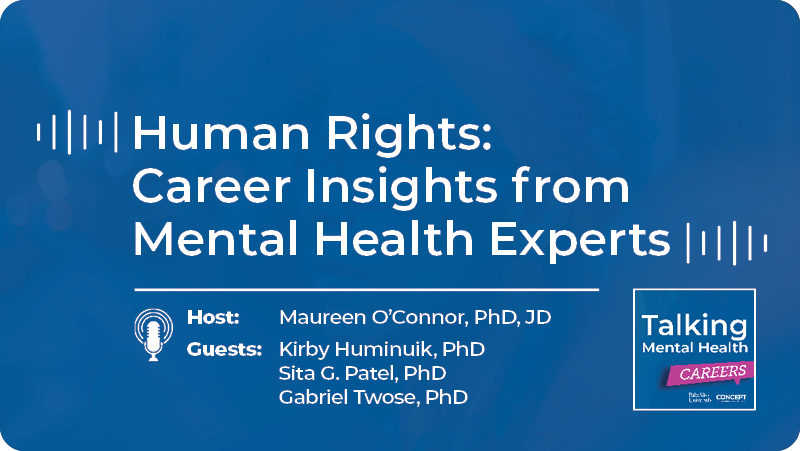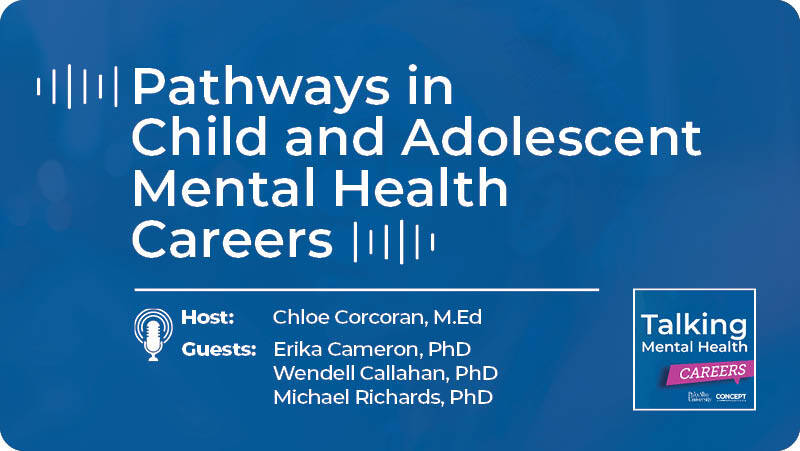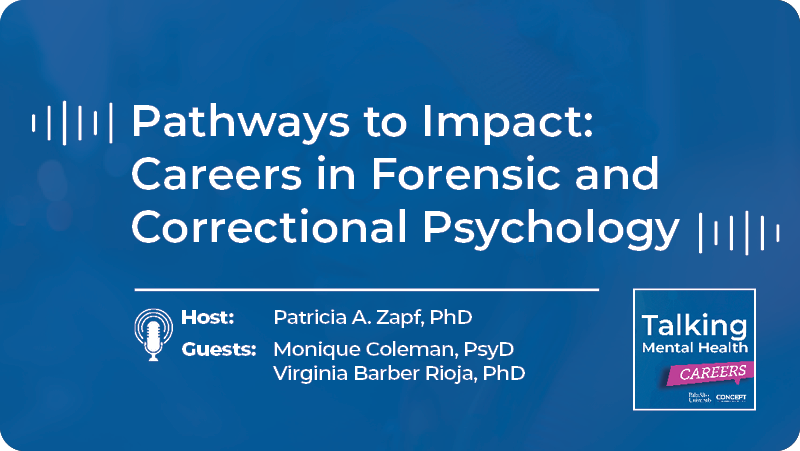Episode 8 | Human Rights: Career Insights from Mental Health Experts
In this episode of "Talking Mental Health Careers," Dr. O'Connor delves into the topic of human rights and social justice, offering key insights for those aspiring to make an impact in mental health fields. Our guests discuss topics from trauma and healing to policy advocacy at the UN, and community psychology's role in supporting refugees. This episode highlights diverse career paths, focusing on how education, research, and training in psychology can support human rights and promote social justice.
Join us on an inspiring journey with 'Talking Mental Health Careers' brought to you by Palo Alto University and CONCEPT, its Division of Continuing & Professional Studies
About Our Host
Maureen O’Connor, Ph.D., J.D is the president of Palo Alto University (PAU) which specializes in Psychology and Counseling. Prior to joining PAU, Dr. O’Connor held multiple roles at the City University of New York (CUNY) in New York City over a period of 18 years. Dr. O’Connor completed a Ph.D. and J.D. in a dual degree program in psychology, law, and policy at the University of Arizona and clerked for the late Honorable Patricia Wald, then Chief Judge of the D.C. Circuit Court of Appeals prior to launching her academic career. An American Psychological Association (APA) Fellow, she has held numerous governance roles in APA, including as Chair of its Task Force on Human Rights. She has been active in the Society for the Psychological Study of Social Issues (SPSSI/APA Division 9) for many years, including serving as its President. Recent work focused on evidence-based pedagogy development for doctoral students, and on innovative mentoring strategies. Her 2019 book, Teaching Psychology: An Evidence-Based Approach (2019), with co-authors Drs. Jill Grose-Fifer and Patricia Brooks, was published by Wiley Press. She is a member of the 39th class of the American Leadership Fellows program in Silicon Valley and serves on the Executive Committee of the Association of Independent California Colleges and Universities.
About Our Guests
Guest 1 | Gabriel Twose, PhD
Gabriel Twose is the Senior International Affairs Officer and Main Representative to the United Nations (UN) at the American Psychological Association (APA), where he works to advance and apply psychology globally, with a particular focus on human rights. UN priorities include global mental health, climate change, and anti-racism efforts. He previously worked as a lobbyist for APA and for the Society for the Psychological Study of Social Issues, using psychological science to advocate for civil rights-related issues. Relevant publications include the edited International Handbook of Peace and Reconciliation and a chapter in the recent Cambridge Handbook of Psychology and Human Rights. He received his PhD in social psychology from Clark University, where his research focused on post-conflict societal reconciliation, particularly through the implementation of truth commissions.
Guest 2 | Kirby Huminuik, PhD
Kirby Huminuik is a Registered Psychologist and the Director of Counselling Services at the University of British Columbia. She is responsible for the integration and delivery of mental health services across Student Health and Wellbeing at UBC. She also provides oversight of Master’s and Doctoral training programs, while providing clinical supervision for doctoral trainees. Dr. Huminuik’s research and community-based work is focused at the intersection between counselling psychology and human rights and she has published academic and community-based research on refugee mental health. Having earned the Global Mental Health Certificate from the Harvard Medical School in 2014, she maintains a specialization in this area of practice. She has been responsible for international psychosocial human rights projects funded by the United Nations Voluntary Fund for Victims of Torture and the Canadian International Development Agency. She provides pro-bono psychological assessment for refugee claimants, and consultation, program development, and professional training services for refugee supporting agencies in Vancouver.
Guest 3 | Sita G. Patel, PhD
Dr. Sita G. Patel is a clinical and community psychologist with research interests in global mental health, and culture and context as they relate to immigrant mental health. Her work uses mixed-methods approaches to study acculturation stress, psychological, social, and academic adjustment, and access to treatment for mental illness among immigrant and minority populations. Her current projects include an APA Div. 27-funded longitudinal school-based study of risk and resiliency among newcomer adolescent immigrants; a community partnership focusing on refugee mental health and access to treatment for trauma; and a USAID-funded study of trauma healing as a component of peace building in the Central African Republic. Dr. Patel was awarded a U.C. Berkeley Dissertation Award in 2006, an American Psychological Foundation Graduate Research Award in 2008, and an NIH Health Disparities Research Loan Repayment grant in 2009.





















